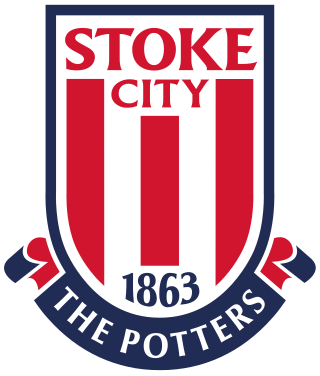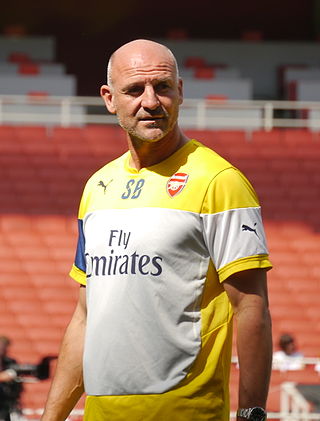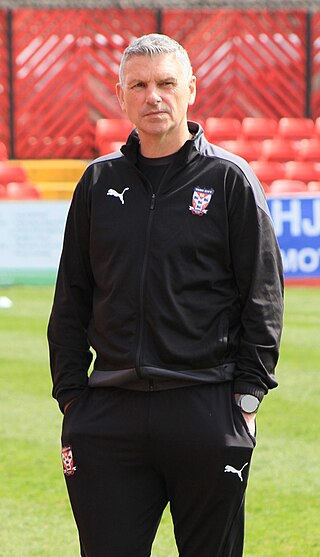Related Research Articles

Stoke City Football Club is a professional association football club based in Stoke-on-Trent, Staffordshire, England. The team competes in the EFL Championship, the second level of the English football league system.
James McIlroy was a Northern Ireland international footballer, who played for Glentoran, Burnley, Stoke City and Oldham Athletic. He was regarded as one of Burnley's greatest players, having played 497 matches and scoring 131 goals. McIlroy also managed Oldham Athletic and Bolton Wanderers.
Aaron Joseph Callaghan is a football manager and retired player. He played in the Football League for Stoke City, Crewe Alexandra, Oldham Athletic and Preston North End.

Samuel Baxter McIlroy is a Northern Irish retired footballer who played for Manchester United, Stoke City, Manchester City, Örgryte (Sweden), Bury, VfB Mödling (Austria), Preston North End and the Northern Ireland national team.
Michael Pejic is a former England international footballer who played in the English Football League for Stoke City, Everton and Aston Villa.

Stephen Andrew Bould is an English football coach and former professional footballer. He is currently the head coach of Lommel SK.
George Frederick Berry is a Welsh former international footballer, who played as a centre back. He was a tough-tackling defender also noted for his distinctive afro haircut.

Gerald Taggart is a Northern Irish former professional footballer. He played for Barnsley, Bolton Wanderers, Leicester City, Manchester City and Stoke City as well as the Northern Ireland national team.
Alan Bloor is an English former professional footballer and manager. He made 394 league appearances in the Football League for both Potteries teams.
William Dearden is an English former football player, manager and scout. As a player, he scored 101 goals in 404 league games in a 16-year career in the English Football League.

Stoke City Football Club has its origins in Stoke Ramblers, a team formed by former pupils of the Charterhouse School whilst they were apprentices at the North Staffordshire Railway. The club dropped the Ramblers from their name, becoming Stoke Football Club and in 1888 they were founding members of the Football League. In 1925, the club's name was changed for the final time to Stoke City Football Club when Stoke-on-Trent was granted city status.
Richie Joseph Barker was an English footballer and manager who played in the Football League for Derby County, Notts County and Peterborough United. He was also manager of Shrewsbury Town, Stoke City, Notts County, Ethnikos Piraeus (Greece), Zamalek (Egypt) and West Bromwich Albion.
Mark Valentine Chamberlain is an English former international footballer. He is the younger brother of Neville Chamberlain, and the father of Beşiktaş and England international player Alex Oxlade-Chamberlain and Kidderminster Harriers's Christian Oxlade-Chamberlain.
Brendan Richard O'Callaghan is a former professional footballer who played in the Football League for Doncaster Rovers and Stoke City and Oldham Athletic. Born in England, he made six appearances for the Republic of Ireland national team.
Anthony John Lacey is an English former footballer who played as a midfielder for Stoke City, Port Vale, Rochdale, and Stafford Rangers. He made 288 league appearances in a ten-year career in the Football League. He won promotion out of the Fourth Division with Port Vale in 1969–70. He later went into coaching with Stoke City and served as caretaker manager for eight games in 1985. He began coaching at the Wolverhampton Wanderers Academy in 1996.

John Colin Askey is an English professional football manager and former player who is the manager of National League South club Truro City.
David John Kevan is a Scottish football coach and former player.
Alan Philpott was an English footballer who played in the Football League for Oldham Athletic and Stoke City.
The 1983–84 season was Stoke City's 77th season in the Football League and the 51st in the First Division.
References
- 1 2 3 4 5 6 Kent, Jeff (1996). Port Vale Personalities. Witan Books. p. 11. ISBN 0-9529152-0-0.
- 1 2 Matthews, Tony (1994). The Encyclopaedia of Stoke City. Lion Press. ISBN 0-9524151-0-0.
- 1 2 3 4 5 6 7 8 9 10 11 Matthews, Tony (18 December 2008). The Legends of Stoke City. Derby, United Kingdom: Breedon Books. pp. 14–5. ISBN 978-1-85983-653-8.
- 1 2 3 4 5 Stoke City 101 Golden Greats. Desert Islands Books. 2002. pp. 139–41. ISBN 1-874287554.
- 1 2 Bill Asprey at the English National Football Archive (subscription required)
- ↑ Bill Asprey management career statistics at Soccerbase